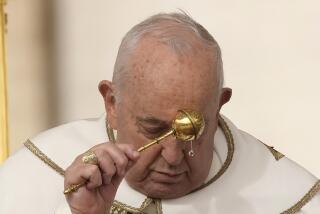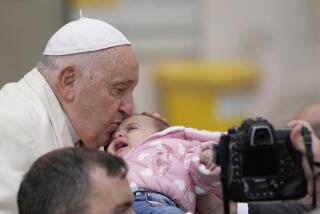Syrian Leader Urges Pope to Back Arabs in Conflict
- Share via
DAMASCUS, Syria — This nation’s leader challenged Pope John Paul II on Saturday to side with Arabs in the Middle East conflict, claiming that Israel is persecuting its neighbors as the Jews persecuted Jesus.
John Paul arrived in Damascus on the second day of a six-day pilgrimage, saying he was bringing an “ardent prayer of hope” for peace. But President Bashar Assad’s strident welcome speech served only to underline the region’s persistent antagonisms.
“All of us have learned a great deal of the suffering and agony of Jesus Christ at the hands of those who resisted the divine and human principles and values he preached,” Assad told the first pontiff ever to visit Syria. He said it is John Paul’s responsibility, as the leader of Christ’s church, to stand up for those values.
“We feel that in your prayers, when you recall the agony of Jesus, you will remember the people of Lebanon, the Golan [Heights] and Palestine who are tormented,” he added. “We expect your holiness to be on their side in their endeavor to regain what was unjustly usurped from them.”
The pope is accustomed to politicians trying to bend his religious pilgrimages to partisan ends. But the greeting by the 35-year-old Syrian, relishing one of his first forays onto the world stage, was one of the bluntest John Paul has heard on his 93 foreign trips.
It plunged the 80-year-old pope back into a conflict that looks far more intractable than it did during his historic pilgrimage to Israel and the Palestinian territories 14 months ago--one he hoped would help heal divisions among Arabs, Jews and Christians.
Assad, who succeeded his late father at the Syrian helm in July, caused a stir in March by saying Israelis are more racist than Nazis. On Saturday, he told the pope that Israel is slaughtering Palestinians, occupying Arab lands, attacking Muslim and Christian religious sites, and trying “to kill all the principles of divine faiths with the same mentality in which they betrayed Jesus.”
John Paul, on a pilgrimage to retrace St. Paul’s footsteps through Greece, Syria and Malta, listened impassively to a translator as Assad spoke in Arabic. The pope replied evenhandedly with a challenge of his own, urging the Syrian to “spare no effort” in the search for “greater harmony and cooperation among peoples of the region.”
“My pilgrimage is also an ardent prayer of hope . . . that fear will turn to trust, and contempt to mutual esteem, that force will give way to dialogue,” he said, seated next to Assad in a Damascus airport lounge.
Later, the two men met privately at the presidential palace. Syria’s state news agency said the pope told Assad: “Syria remains young in history, and today it is led by a young man. That is why everyone expects a lot from her.”
About 1,500 Muslim and Christian schoolchildren bused to the airport cheered as the white-robed John Paul appeared at the door of his plane. They wore caps in the Vatican’s colors, yellow and white, and carried banners in Arabic and English. “We want to live like other children in the world: far from Israeli occupation,” one read.
In the evening, several thousand well-wishers cheered and threw rose petals as the pope arrived for an ecumenical prayer service at the ancient Greek Orthodox cathedral here. Police had to push back the surging, festive crowd after it broke through security cordons in the Christian quarter of Old Damascus, trying to touch the ailing, tired-looking visitor.
The service drew worshipers from Syria’s Roman Catholic and three main Orthodox churches, which account for 2 million Christians in this predominantly Muslim country of 17 million people.
Today in Damascus, John Paul plans to become the first pope ever to enter a mosque, in a groundbreaking gesture of friendship to Muslims.
On Monday, he is scheduled to pray for peace in the demolished town of Kuneitra, which Israel returned in 1974 after capturing it in the 1967 Middle East War. Peace talks that could put it and the rest of the Golan Heights back in Syrian hands have stalled.
John Paul repeated Vatican policy on the Middle East, calling for “the banning of acquisition of territory by force” and supporting “the right of peoples to self-determination.”
That policy goes for Syria’s more than 30,000 troops in neighboring Lebanon, as well as for Israeli occupation of Arab lands. But John Paul did not mention Lebanon, spokesman Joaquin Navarro-Valls said.
More to Read
Sign up for Essential California
The most important California stories and recommendations in your inbox every morning.
You may occasionally receive promotional content from the Los Angeles Times.









